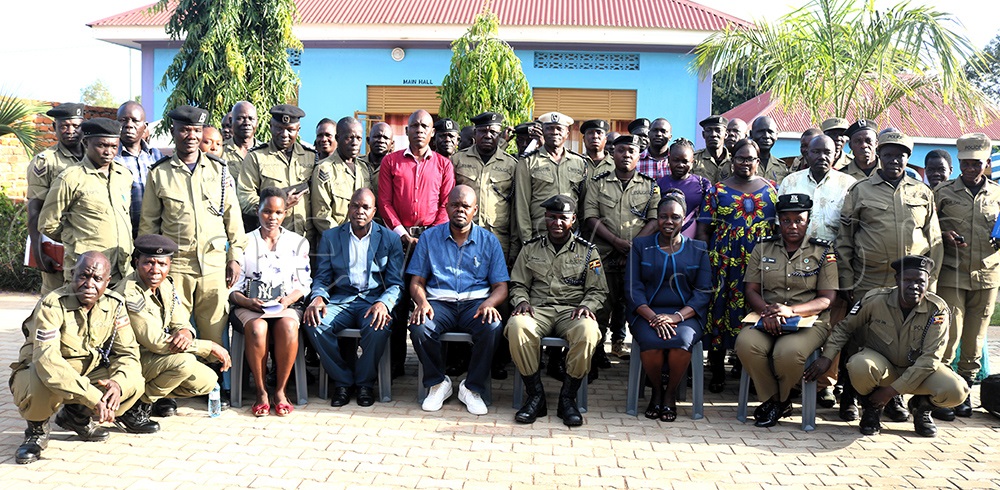Public tasked to report police officers who extort for fuel, printing
Zaake explained that the Inspector General of Police (IGP) provides funds for fuel, and therefore, no officer should extort money from the public. He called on citizens to challenge such officers to explain why they continue to exploit people.
The Regional Police Commander West Nile region SSP Latif Zaake addressing Police officer in Koboko during a Human Rights training. (Photo By Robert Ariaka)
___________________
The regional police commander for the West Nile region, SSP Latif Zaake, has urged members of the public to report any police officer who demands money for fuel or printing papers while on duty.
Zaake explained that the Inspector General of Police (IGP) provides funds for fuel, and therefore, no officer should extort money from the public. He called on citizens to challenge such officers to explain why they continue to exploit people.
“The IGP and Police leadership is dealing with structural issues to ensure the gaps are closed to stop flouting of human rights issues,” Zaake revealed.
Speaking during a one-day training organised by the Uganda Human Rights Commission (UHRC) in Koboko district on August 26, 2025, Zaake said that mistakes are committed by individual officers, not the institution. He stressed that the police have systems in place to check errant officers and ensure compliance with respect for human rights.
West Nile Regional Police Commander SSP Latif Zaake posing for a photo with other police officers after a one day training on Human Rights in Koboko. (Photo By Robert Ariaka)
“There is no contradiction between our work as Uganda Police Force and that of Uganda Human Rights Commission. If you look at our work as Police, it is to protect the lives of Ugandans, their rights and property,” Zaake told the officers.
The training at Blue Cuts Motel brought together 50 police officers from across the region to strengthen their understanding of human rights. It addressed issues such as premature arrests, over-detention, and the protection of vulnerable groups.
Zaake added that matters relating to facilitation, including feeding suspects, fuel, and general operations, are being handled by police leadership.
“This financial year, we are implementing a subcounty policing model, and a lot of resources are trickling down in terms of funding, infrastructure, manpower and equipment. If we support this, we shall address human rights abuses and serve the people better,” he explained.
He advised officers to adopt a humane approach in handling cases, arrests, and general interactions with the public. According to Zaake, the issue of manpower remains a structural challenge that requires a broader solution. He recommended rewarding diligent officers with promotions to create room for new recruits.
Recently, over 10,000 recruits were taken on by the Uganda Police Force. Once training is complete, they will be deployed to address manpower shortages.
On refugee policing, Zaake noted that engagements have been carried out in refugee settlements to sensitise communities on the importance of following the law.
“If you are a refugee, you are not above the laws of the country, and we have been engaging them to adhere to the laws of Uganda. Those who go against the law, the law will take control of them just like any other Ugandan,” Zaake explained.
He emphasised that upholding human rights remains central to police work, noting that detecting and preventing crimes is in itself the protection of rights.
“We have the UPF Human rights policing expected of an officer to uphold in relation to the supreme law of the country. If you abuse the right of a suspect, the Judicial officer will first look at the case of torture before handling the main case of arresting the person,” Zaake told the officers.
Byonabye Kamadi, the director of education, research and documentation at the UHRC, reminded officers of their constitutional obligations under Article 20, which requires all persons and organs of state to protect, uphold, and observe human rights. He further noted that Article 221 mandates the police and other state actors to observe human rights while performing their duties.
Under Article 52, the UHRC is mandated to carry out education, research, and sensitisation. Kamadi warned that violations of citizens’ rights not only undermine trust in government but also expose the state to financial liabilities.
He also cautioned officials who abuse rights, citing UHRC tribunal cases in which officers have been found culpable and ordered to compensate victims.
“We want to prevent it. Instead of somebody being tortured and compensated, it is better to value and uphold rights other than torture,” Kamadi told the officers.
He recalled one case in which a man’s arms were amputated after torture. Although he was awarded sh250 million in compensation, he continues to struggle with basic tasks.